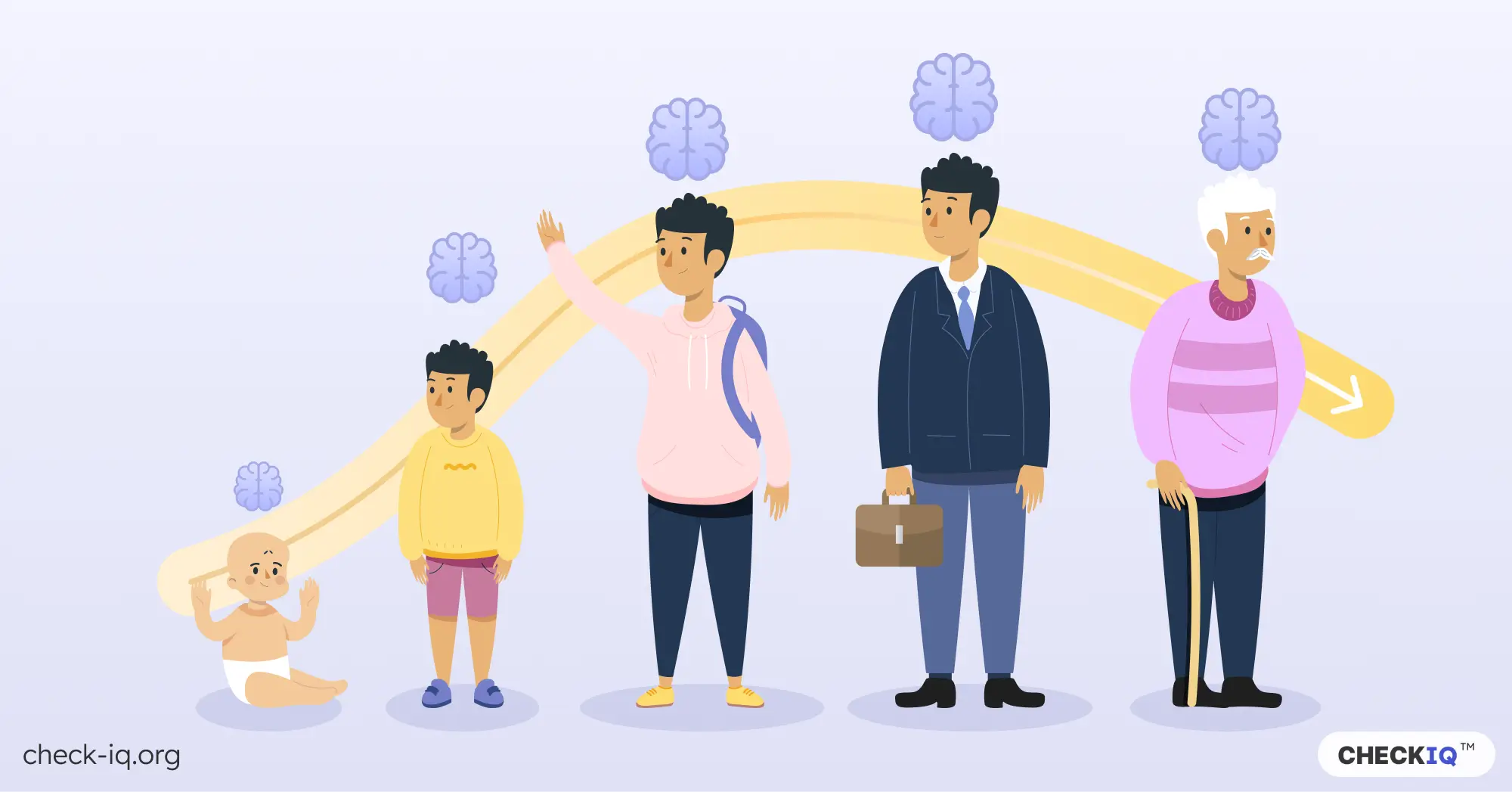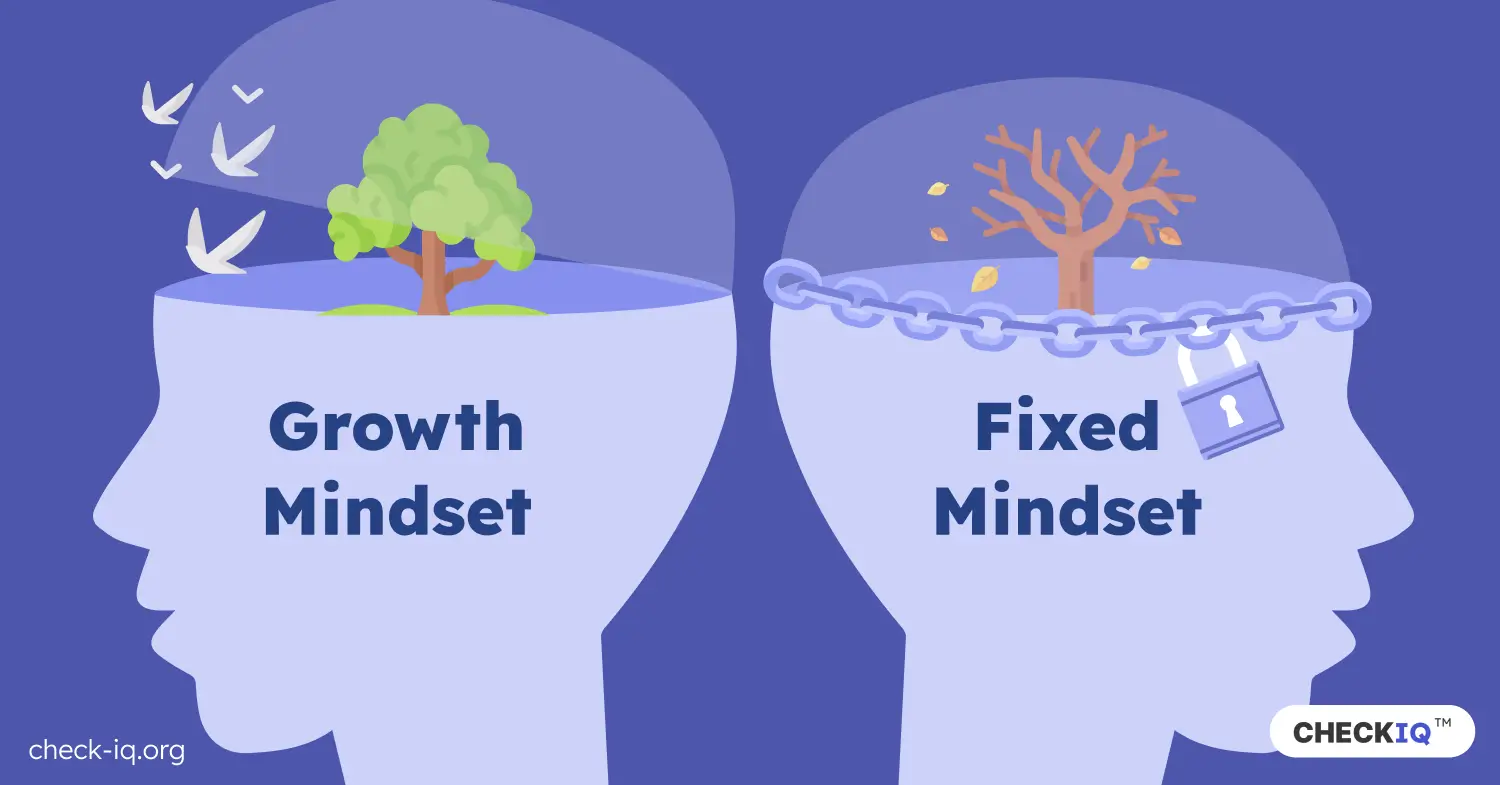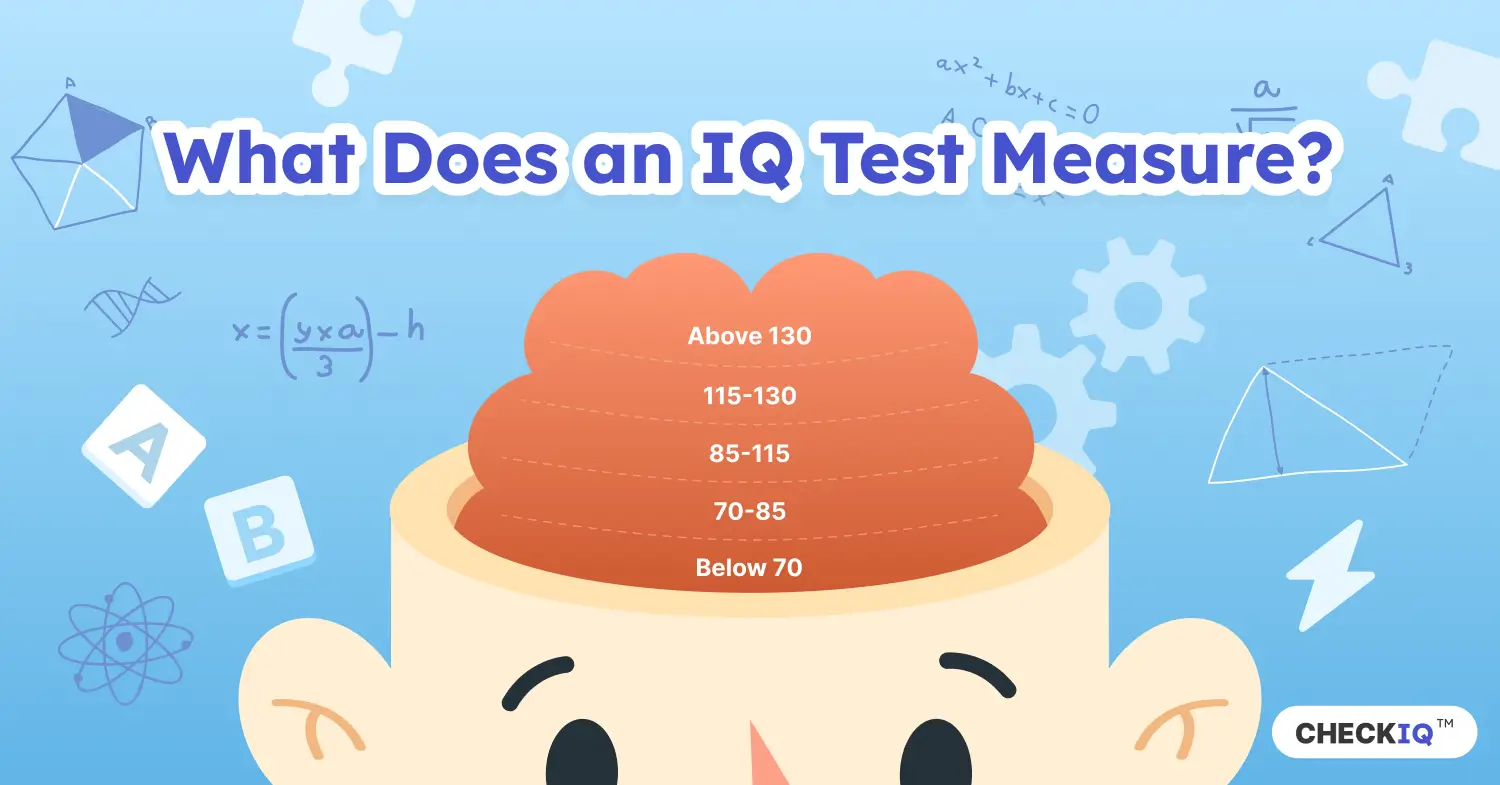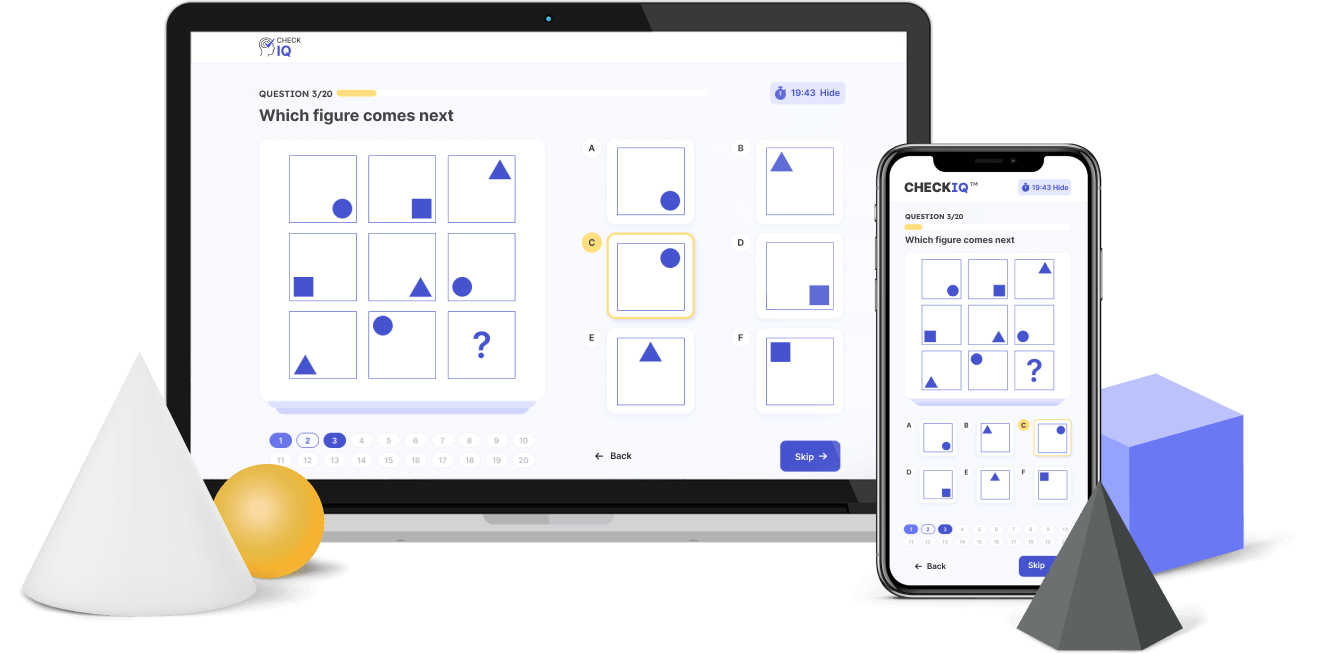There are several studies evaluating the changes that happen to the human brain as we age. Age-related diseases aside, many people find their ability to process information and problem solve slows down with time.
So does that mean your IQ is likely to change over time?
Yes, it does. However, this is not something that happens to everyone. Below, I’ll discuss what IQ is, why IQ scores matter, and how to improve IQ as you age.
What Is IQ and Why Do Scores Matter?
IQ stands for Intelligence Quotient, a number that represents a person's reasoning and problem-solving abilities. Think of it like a scorecard for your cognitive skills. IQ encompasses how you understand ideas, solve puzzles, and make sense of the world. Essentially, IQ tests measure your mental agility.
It's important to know that IQ scores are not just about raw intelligence. They are also about comparing your cognitive abilities to others. Someone with a higher IQ, for example, can navigate a difficult maze more efficiently than someone with a lower IQ score might. These scores matter because they can give both you and researchers insight into certain intellectual strengths and areas for improvement.
Does IQ Change With Age?
Multiple pieces of evidence suggest that IQ changes through your life. While there are variations based on a person’s intellectual capabilities, lifestyle habits, and how they use their brain in daily life, there are notable changes. Let’s take a look at how IQ varies with age.
A reliable 100% adaptive online IQ Test. Get your IQ score immediately.
Start My IQ Test
IQ is not static
IQ does change over time but your age is only one contributing factor. Below, I’ll talk about the typical IQ changes during childhood and adolescence, during adulthood, and as a result of the Flynn Effect.
IQ typically increases during childhood and adolescence
Generally, as you grow from childhood into your teen years, your IQ tends to increase. You are acquiring new knowledge, your memory capabilities expand, and your brain develops critical cognitive functions. When you think about students getting better at algebra or adults picking up a new language, you're seeing IQ growth in action.

Recent studies have even shown that teenagers experience notable changes in their IQ during their formative years. These changes align with brain development. In light of these findings, it’s becoming increasingly clear that the quality of education and mental stimulation you receive as an adolescent plays a big role in IQ scores and mental development.
Cognitive decline and age
However, as you continue to age past your peak cognitive years, different cognitive abilities change at different rates. This typically happens some time during your mid-20s.
Studies have found that average IQ scores do shift over time, as explained by Dr. Alan Kaufman, a Clinical Professor of Psychology at Yale University's Child Study Center in the School of Medicine. It's a gradual process. Fluid intelligence, or the ability to learn, assess, and navigate new scenarios, peaks in your young adult years. Crystallized intelligence, or the ability to recall knowledge you have accumulated through life, grows stronger well into middle age.
However, the trend isn't one-directional. Some studies, like this one by American Researchers, show that while specific mental faculties like memory may decline, other aspects of intelligence remain steady or even improve with age. This particular research delved into how aging and intelligence influence memory through various tests. It found that IQ had a significant role in how swiftly and accurately people could recall and recognize things, with higher IQs linked to better and quicker memory performance. Interestingly, while a good memory is often associated with high IQ, the relationship is complex and not always linear. Yet, age showed a more nuanced effect, depending on the memory task in question.
IQ and the Flynn Effect
In addition to each person’s IQ changing over time, the IQ of society as a whole has increased. The Flynn Effect, named for James Flynn, describes these changes. Flynn observed IQ test results over a period of 46 years. With each generation tested, average IQ increased by 13.8 points. Note that recently, researchers have pointed out a new trend which they have called the Reverse Flynn Effect, which indicates that in some regions, IQ scores have started to decrease across generations. This suggests that various factors, such as changes in education, environment, and societal conditions, can impact IQ trends over time.
What does this mean for you? Well, intelligence is not static - it evolves. IQ tests must also evolve to accurately represent a person’s intelligence.
Does the Brain Slow Down With Age?
Even as we age and our response times to changes in our environment may slow, the depth and richness of our cognitive abilities can still experience growth. This is especially true in areas fueled by a lifetime of learning.
A groundbreaking study published in Nature Human Behaviour revealed that while brain processing speeds may peak in our early 20s and decline thereafter, this isn’t the whole story. More than one million participants were included in this research. The result? Even though the rate that a person does cognitive tasks might decline after age 20, this doesn't necessarily indicate declining mental speed.
According to scientists from Heidelberg University in Germany, the observed slowdown could be attributed to other factors. For example, an increase in decision-making caution and slower non-decisional processes, such as the physical act of pressing a key.

This finding suggests that older individuals, often perceived as slower thinkers, actually exhibit a nuanced shift in cognitive processing. They may take more time for decisions, possibly reflecting greater care or depth of understanding rather than a straightforward decrease in mental agility.
Moreover, while some cognitive skills might face challenges with age, verbal intelligence, rooted in years of accumulated knowledge and experience, often continues to thrive.
Therefore, the shift in cognitive abilities as we age might result in a trade-off: what is lost in the speed of mental processing could be compensated for with enhanced wisdom and a deeper understanding of complex concepts.
When is IQ highest?
While it's commonly believed that young minds are particularly sharp, the exact age when IQ peaks has been a topic of interest. Contrary to the idea of a single 'peak' age, Harvard researchers suggest that IQ and cognitive performance are dynamic. Patterns of growth and different mental capabilities change depending on the specific cognitive task.
Their extensive analysis, involving over 48,000 participants and a thorough review of standardized IQ and memory tests, reveals that cognitive abilities do not peak at a uniform age. Instead, they demonstrate considerable variation. Some cognitive skills peak and start to decline around the end of high school, others plateau in early adulthood and begin declining in the 30s, and some don't peak until the 40s or beyond.
This nuanced understanding of cognitive development indicates that there's no one-size-fits-all answer to when IQ is at its highest. Factors including the type of cognitive skill, biological maturation, and personal experiences, including exposure to new challenges and information, play significant roles. The study also highlights the importance of continuous learning and mental engagement at all ages. This suggests that certain cognitive functions, especially those reliant on accumulated knowledge and experience, can improve well into later adulthood.
In light of these findings, the notion of a static 'peak' IQ is replaced by a more complex picture of ongoing cognitive evolution, emphasizing the potential for growth and adaptation throughout life.
How to Improve IQ As You Age
Finally, let’s talk about improving IQ as you age. It is possible to reduce cognitive decline and even improve IQ. Like any muscles, the brain is able to be worked out and ends up stronger.
Can IQ increase after its peak?
Imagine your IQ as a muscle in your brain. Just as a bodybuilder can increase muscle strength at any age with the right training, you might be able to boost your IQ even after it's reached a supposed peak. Surprising?
Research suggests that with specific types of mental exercises, such as creative problem-solving, playing Chess, risk, or other strategy games, mind mapping, and logic problems significant improvements in IQ scores can be achieved. This may come as a revelation, especially if you've been led to believe that your intelligence plateaued in early adulthood.
Take the study by researchers from the University of Sydney, for example, which observed a marked uptick in IQ scores following intensive training. Not just by a few measly points, but by an impressive 10 to 15 points on average. This indicates tangible changes in both fluid intelligence - your ability to think on your feet - and crystallized intelligence - the knowledge you've accumulated over the years.
The inference is clear: engaging in activities that stimulate your brain, from reading a fiction book or learning a new language to picking up a musical instrument or solving puzzles, can be like a workout for your cognitive skills. This can result in positive brain changes and potentially an increased IQ. So if you are trying to prepare for an IQ test, incorporating more of these activities into your routine can be highly beneficial.
Is it possible to improve child and adolescent IQ?
The seeds of intelligence are often sown early in life, mostly through your parents, but they need the right environmental factors to flourish. An enriching educational experience can make a world of difference in a child’s development. Research spearheaded by the Karolinska Institute revealed that extended schooling had a direct impact on boosting children's IQ. This influence extends well into the teenage years when the brain undergoes significant structural development. Hence, ensuring that children and teenagers have access to quality education not only equips them with knowledge but could also set them up for higher IQs.
It’s worth noting that formal education does not focus solely on a child’s IQ enhancement. Schooling includes a range of experiences such as extracurricular activities, rich parental interactions, and diverse social exposures. While children are taught facts, they are not always taught the problem-solving capabilities and mental measures that might increase IQ.

By engaging in various stimulating activities and being challenged intellectually, a child’s IQ blooms alongside their brains. These changes have been noticed in regions associated with memory and critical thinking. However, it’s worth noting that such growth isn’t just automatic. It is the result of a dynamic interplay between a young individual's learning environment and their neurological development. In the formative years of life, fostering cognitive growth is about providing a vibrant atmosphere for it to occur, one that's filled with learning opportunities and nurturing guidance.
Is it possible to prevent IQ decline?
If you're concerned about maintaining your cognitive sharpness as you age, you're not alone. Many adults worry about potential IQ decline. But the good news is, while some decrease in certain cognitive abilities is natural, there are ways to give your brain a fighting chance.
Engaging in mental exercises, staying socially active, and pursuing lifelong learning can all help manage and even mitigate some of the declines in IQ. MIT's research demonstrated that different brain skills peak at various ages, suggesting that our brains are capable of growth and improvement throughout our lives. By challenging ourselves with problems and enriching our lives with diverse experiences, we can work to maintain our cognitive abilities well into our golden years.








